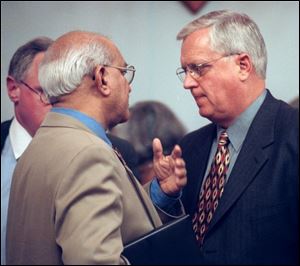
UT board member, ex-chair Langenderfer ending tenure
6/29/2002
Dr. Vik Kapoor, left, and Ronald Langenderfer confer in October, l999. Mr Langenerfer was an early and strong supporter of Dr. Kapoor's candidacy for UT president.
After nine years, four administrations, and more than a bit of controversy, Ronald Langenderfer's term as a member of the board of trustees at the University of Toledo is coming to a close.
The 57-year-old Swanton native presided over his alma mater's board during some of the most tumultuous days in its history, including the ill-fated presidency of Dr. Vik Kapoor.
His term is scheduled to expire Monday, but Gov. Bob Taft has yet to name a replacement. A spokesman for the governor's office said an appointment is expected within the next week.
Mr. Langenderfer, who declined to be interviewed for this article, was appointed to the board of trustees in 1993 by then-Gov. George Voinovich.
The president of Centaur, Inc., the holding company for Heidtman Steel Products, he became the UT board chairman in June, 1998. He was an early and strong supporter of the candidacy of engineering dean Dr. Kapoor to replace retiring president Dr. Frank Horton.
Dr. Kapoor was tapped to lead the university in November, 1998 by a fractured board of trustees, kicking off a troubled 17-month administration that was characterized by faculty complaints of micromanagement, mismanagement, and lack of communication.
Faculty leaders like Harvey Wolff, who was president of the faculty senate during part of Mr. Langenderfer's time as chairman, blame him for some of those problems.
“He certainly seemed to be in control of the board, seemed to be able to get his way when he thought that things should be changed,” Dr. Wolff said.
In February, 2000, Mr. Langenderfer created a stir when he said at a board meeting that university employees who were spreading rumors against UT ought to be investigated and fired.
Days later, the UT chapter of the American Association of University Professors passed a resolution calling for his resignation.
“He definitely reacted in a way that I think hurt the university,” Dr. Wolff said. “In the end, I think he'll be remembered for causing a lot of concern, which we still haven't recovered from.”
Mr. Langenderfer's second term as chairman ended soon after Dr. Kapoor was forced to resign and an interim administration headed by William Decatur, now vice president for finance and administration, was established.
In March, 2001, a more united board unanimously named Dr. Daniel Johnson as UT's 15th president, and sentiment on campus seems to be that things are moving in the right direction again.
Reflecting on his years at the university during his last board meeting on Tuesday, Mr. Langenderfer said, “It's hard to imagine that 40 years ago I decided to attend the University of Toledo on scholarship.”
“One of our responsibilities is that we give back to the university,” he said.
He encouraged officials to remember the importance of athletics in generating enthusiasm and support for the university among students, alumni, and community members.
The son of a tool-and-die maker, Mr. Langenderfer, studied business administration at UT before receiving his degree in 1966.
“He was quite effective in organizing and in being a leader,” said Dr. Jim Brunner, professor emeritus of marketing who taught Mr. Langenderfer as an undergraduate.
While his time as chairman was his most visible, Mr. Langenderfer's nine years on the board were full of change.
The campus has continued to become more residential, with plans to open a new residence hall this fall and build another one in the near future, and overall university enrollment is finally up after years of stagnation. He also was on the board for the creation of the Norman and Lois Nitschke Auditorium and UT's newest college, health and human services.
“I think there's been a tremendous amount of change while he's been there,” said Tom Noe, a member of the Ohio Board of Regents and a childhood friend of Mr. Langenderfer.
“There will always be bumps in the road,” he added. “I think part of effecting change at a university is stirring the pot up a little.”
James Tuschman, who just completed two years as board chairman, said Mr. Langenderfer in recent years took on more of a role as senior statesman.
“His counsel, his opinions, his guidance was helpful, was instructive,” he said.
It isn't fair to place the weight of UT's past problems on Mr. Langenderfer, who always was passionate about the university, he said.
“Those were difficult times. I don't think any of us handled the situation well and I wouldn't single him out,” he said. “It takes a lot of people to have one of those types of events occur.”
And even though his relationship with the faculty was often rocky, Dr. Carter Wilson, a professor of political science and member of the faculty senate, said that Mr. Langenderfer had the best intentions.
“Despite the controversy surrounding Ron Langenderfer and the dark days of the Kapoor era, I do believe that Ron Langenderfer meant well and cared about the university,” he said.